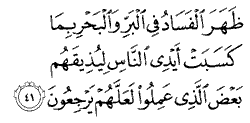Living The Quran
From Issue: 939 [Read full issue]
Corruption
Al-Rum (The Byzantines) Sura 30: Verse 41
 "Corruption has appeared on land and sea because of that which men's hands have earned, that He may let them taste some of that which they have done, that haply they might return."
"Corruption has appeared on land and sea because of that which men's hands have earned, that He may let them taste some of that which they have done, that haply they might return."
Corruption (fasad) implies all manner of decadence and injustice, in regard to both rebelling against God and oppressing others, thus failing to recognize the rights of all. It is often understood by commentators to mean open disobedience toward God. In both 2: 27 and 13: 25, corruption is presented as part and parcel of breaking the covenant; and in 5: 33 working corruption is linked to rejecting God's messengers. In general, when human caprice is followed rather than Divine ordinances, corruption ensues, as in 23: 71. As such, corruption can be linked to all manner of iniquity, such as arrogance (see 7: 74), oppression (26: 183; 28: 4), and failing to honour family relations (47: 22). Though working corruption is an accusation made against several specific human collectivities, such as the Children of Israel (17: 4) and the pre-Islamic Arabian tribes of Thamud (26: 152) and Midian (7: 85: 29: 36), it is recognized as a general human shortcoming (2: 30). Working corruption implies a combination of spiritual and worldly corruption (e.g., 2: 27; 7: 74, 85-86, 103; 11: 85; 13: 25); and it is implicitly or explicitly connected to physical violence in several verses (e.g., 2: 205; 5: 64; 26: 183; 27: 48-49; 28: 4). The opposite of working corruption (ifsad) is islah, "setting things aright" or "making amends," and elsewhere corruption is put in direct contrast to performing righteous deeds (salihat) (38: 28).
In the present verse corruption is said to appear because of that which men's hands have earned while elsewhere it is said that it is through the works of men that corruption is repelled (2: 251). The final ends of those who work corruption and those who oppose it are thus divergent. Heaven is ordained for the latter (28: 83); and punishment for the former (16: 88). That God will let them taste some of that which they have done means that God will allow them to experience some form of trial or punishment in this life in hopes that it may help them turn toward repentance and thus be forgiven and absolved of experiencing the full punishment in the Hereafter. That haply they might return thus implies that they might repent and refrain from committing acts of disobedience in the future.
Compiled From:
"The Study Quran: A New Translation and Commentary" - Seyyed Hossein Nasr